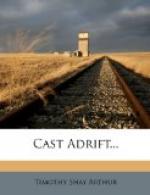“But somebody should see after a poor baby like that. Is there no law to meet such cases?”
“The poor baby has no vote,” replied Mr. Dinneford, “and law-makers don’t concern themselves much about that sort of constituency; and even if they did, the executors of law would be found indifferent. They are much more careful to protect those whose business it is to make drunken beggars like the one you saw, who, if men, can vote and give them place and power. The poor baby is far beneath their consideration.”
“But not of Him,” said Edith, with eyes full of tears, “who took little children in his arms and blessed them, and said, Suffer them to come unto me and forbid them not, for of such is the kingdom of heaven.”
“Our law-makers are not, I fear, of his kingdom,” answered Mr. Dinneford, gravely, “but of the kingdom of this world.”
A little while after, Edith, who had remained silent and thoughtful, said, with a tremor in her voice,
“Father, did you see my baby?”
Mr. Dinneford started at so unexpected a question, surprised and disturbed. He did not reply, and Edith put the question again.
“No, my dear,” he answered, with a hesitation of manner that was almost painful.
After looking into his face steadily for some moments, Edith dropped her eyes to the floor, and there was a constrained silence between them for a good while.
“You never saw it?” she queried, again lifting her eyes to her father’s face. Her own was much paler than when she first put the question.
“Never.”
“Why?” asked Edith.
She waited for a little while, and then said,
“Why don’t you answer me, father?”
“It was never brought to me.”
“Oh, father!”
“You were very ill, and a nurse was procured immediately.”
“I was not too sick to see my baby,” said Edith, with white, quivering lips. “If they had laid it in my bosom as soon as it was born, I would never have been so ill, and the baby would not have died. If—if—”
She held back what she was about saying, shutting her lips tightly. Her face remained very pale and strangely agitated. Nothing more was then said.
A day or two afterward, Edith asked her mother, with an abruptness that sent the color to her face, “Where was my baby buried?”
“In our lot at Fairview,” was replied, after a moment’s pause.
Edith said no more, but on that very day, regardless of a heavy rain that was falling, went out to the cemetery alone and searched in the family lot for the little mound that covered her baby—searched, but did not find it. She came back so changed in appearance that when her mother saw her she exclaimed,
“Why, Edith! Are you sick?”
“I have been looking for my baby’s grave and cannot find it,” she answered. “There is something wrong, mother. What was done with my baby? I must know.” And she caught her mother’s wrists with both of her hands in a tight grip, and sent searching glances down through her eyes.




